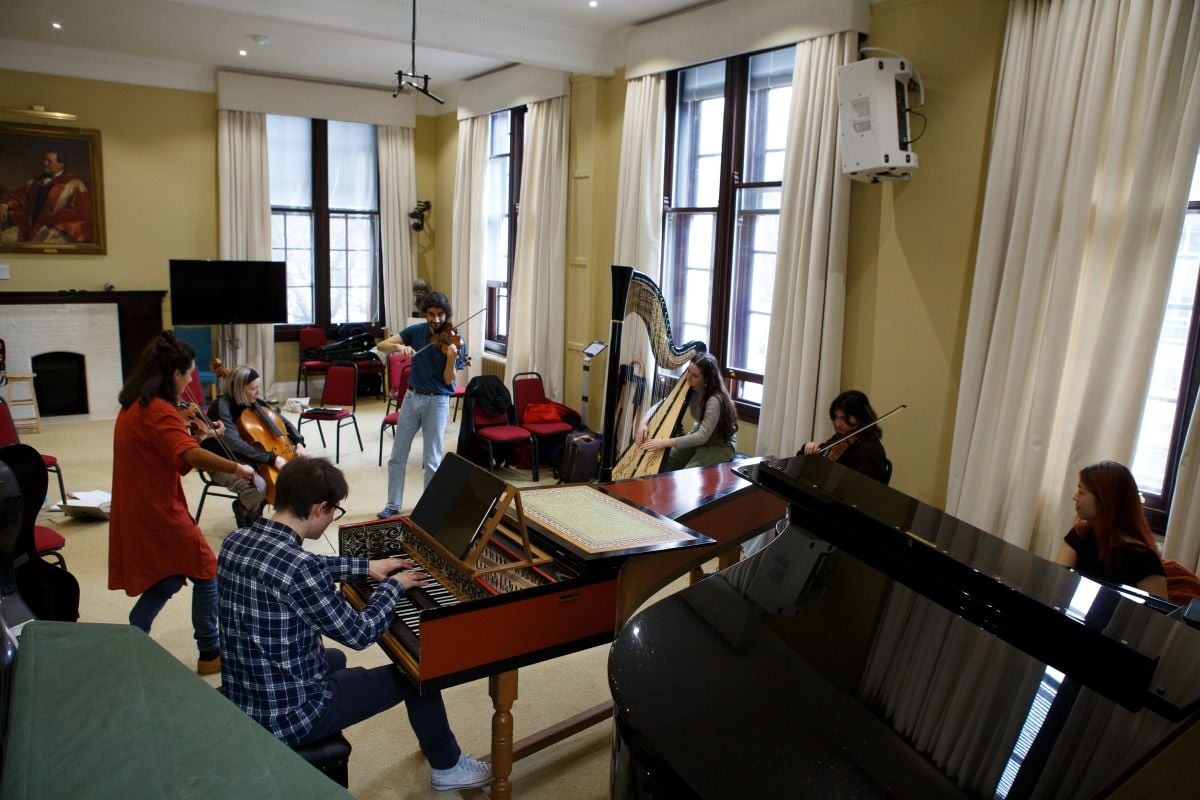
Students on the Future Artists scheme working with working with Southbank's artist in residence, violinist Rakhi Singh, co-founder of Manchester Collective
How prepared are young musicians for professional life?
A ground-breaking initiative from the Royal Academy of Music in partnership with Southbank Centre – Future Artists – seeks to equip students to use their multiple skills, writes Jessica Walker.
The genesis of Future Artists – a new scheme for student performer-creators – came about through a series of discussions I had with Toks Dada, Head of Classical Music at Southbank Centre. Toks had recently initiated the Southbank’s artist-in-residence model, in which he invites musicians to explore their creativity over a year or more of projects – as opposed to booking them for one-off concerts.
This model has many advantages. It encourages audiences to build up interest in particular artists; it allows musicians to take creative risks; and it is a more economically viable way of presenting a varied and exciting programme.
But most importantly, perhaps, it puts the relationship between artist and organisation at the forefront of programming: the projects are artist-led, with a genuine nurturing of creative ideas.
Musical training should reflect industry practice
During a chat about the musicians Toks had invited to be the first artists in residence, we found ourselves pondering where artists in residence of the future would come from, particularly if the training of musicians fails to reflect the realities of current industry practice.
The professional and creative lives of musicians are changing fast. Even before recent cuts to funding, and the ever-decreasing returns of Brexit, there has been a sense that the one-track career is a thing of the past.
Making work across genres, curating, producing and collaborating are all becoming a more established and increasingly necessary part of a professional classical musician’s life – either alongside or instead of more traditional forms of employment.
Foregrounding and exploring individual creative identity is also becoming much more mainstream for both classical and hybrid artists. From cellist Abel Selacoe to guitarist Sean Shibe to violinist Patricia Kopatchinskaja, musicians moving between genres and taking artistic risks are being widely programmed and celebrated.
How do musicians fit in the world of professional music making?
Conservatoires need not only to reflect this change of professional travel, but to anticipate it, so that students can develop an understanding of how they might fit into the world of professional music-making and, consequently, how they might enjoy meaningful and long-term careers. We are not doing our job properly if students leave only imagining a career in an orchestra.
Toks and I agreed that the core credo of Future Artists would be to capture and build on the dynamic shift towards autonomy and authenticity of expression, creating a means through which students could engage with their creative and professional possibilities, all under expert industry guidance.
The bespoke scheme was piloted last year. Students coming towards the end of their undergraduate and postgraduate degrees were invited to apply. Having selected six outward-looking and multi-genre musicians, we paired them with the visionary violinist Daniel Pioro, one of Southbank’s artists in residence.
Through a series of workshops, including improvisation and deep listening, the students developed new work, which they performed with Daniel in the Purcell Room. A singer who had never composed before wrote a new song cycle about periods, with accompanying visual art; a harpist who had never improvised, extemporised live on stage in a duo with Daniel.
The scheme provides unique opportunities
This year’s students are working with virtuoso violinist Rakhi Singh, co-founder of Manchester Collective, another of Southbank’s artists in residence. I have yet to see what form the final concert will take, but there has been a sense that Rakhi has encouraged a deeply non-hierarchical and open approach to the creation and curation of the material, in line with her Manchester Collective ethos.
Alongside the musical mentoring, Future Artists includes invitations to Southbank concerts, rehearsals and Q&A sessions with other artists in residence. Toks and Adam Szabo – the other co-founder of Manchester Collective and the newly appointed Director of the BBC Philharmonic – recently gave a joint talk about how they programme, who they programme, and how to build a classical ensemble.
A talk like this provides invaluable information. Without such a scheme, it is unlikely students would have the opportunity to discover the inner workings of a major arts organisation like Southbank, or of an ensemble like the Manchester Collective built from tiny beginnings to performing at the Proms in the space of seven years.
Blend of pedagogy and industry knowledge
Southbank is invested in nurturing links between conservatoire education and the professional realm – as am I in my role at the Academy. It is only by forging such links, and by understanding the needs of both that we can create a path for young musicians to thrive in the world of work.
With its blend of pedagogical and professional input, we hope Future Artists will enable students to become the change-makers, music innovators and artists-in-residence of the future.
Its efficacy will reveal itself down the line. If Toks books one of them, it will be mission accomplished.
Dr Jessica Walker is Senior Lecturer and Lead in Artist Development at the Royal Academy of Music.
![]() ram.ac.uk/ | southbankcentre.co.uk/
ram.ac.uk/ | southbankcentre.co.uk/
![]() @RoyalAcadMusic | @j4jessicawalker | @southbankcentre | @ToksDada
@RoyalAcadMusic | @j4jessicawalker | @southbankcentre | @ToksDada
Join the Discussion
You must be logged in to post a comment.